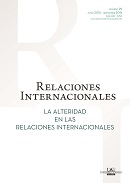‘We Must Kill the Bandits’: Identity, alterity, and the state of exception in Haiti (2004-2006)
Keywords:
Coloniality of power , coloniality of being , alterity , identity , state of exceptionCopyright (c) 2015 Melody FONSECA

This work is licensed under a Creative Commons Attribution-NonCommercial-NoDerivatives 4.0 International License.
Abstract
How are bandits constructed and how are they labelled as such? How is alterity and its relation with power managed? How do power dispositifs operate in order to differentiate between the life of some and the death of others? In this article I discuss, firstly, how the concept of alterity has been analyzed from different critical approaches such as poststructuralism, postcolonial studies and decolonial thinking inside and outside of the International Relations discipline. Secondly, I present a brief historical summary of main moments in Haitian history where the construction of the Haitian as a feared subject served to contain or convert their otherness. Lastly, I analyze how the pacification process in Haiti after Jean Bertrand Aristide’s withdrawal from government in 2004, the United Nations peacekeepers and Haitian National Police deployed a set of discoursive dispositifs about certain sectors of Haitian population that permit the naturalization of the murder of thousands of citizens in the name of order.





